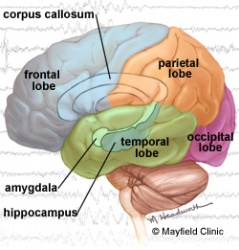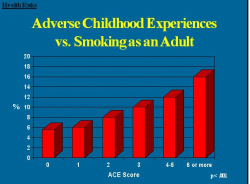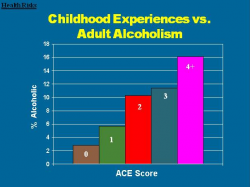With 23.5 million addicts in the U.S it is worth asking the question why is addiction so prevalent in our society. One potential cause maybe our childhood, the lives we have lived and our experiences. It is particularly important to explore the potential cause of our childhood, considering that family dysfunction and neglect is often a consequence of addiction creating a vicious cycle that it very difficult to break. This undoubted connection also raises the question, does addiction run in families because of experiences and learned behavior or do we inherit addiction through of genes? Addiction being such a complex disease maybe it is more plausible that these potential causes combined can influence the predisposition to become addicted. The following article will consider specifically the influence of our childhoods and life experiences on our probability of becoming an addict.
There are numerous studies to suggest that childhood trauma heightens our potential to become an addict, specifically people who have suffered childhood trauma are 4,600% more likely to become and injecting drug user than those who have not. Children of addicted parents are eight times more likely to to become addicted overall. This cannot be simply attributed to genetics alone when we consider the highly stressful, chaotic and uncertain environment such children live in. As we have discussed in previous research pieces often addiction develops as a result of self medication to cope with mental illnesses, such as depression, anxiety or stress disorders; attempting in vain to forget and ease the pain of memories and events.
Genetics, Addiction & The Brain

To examine the evidence we need to consider the argument of genetics and a number of scientists and studies suggest that this it is a major factor in potential addiction. Recent developments in understanding addiction show that our brain in terms of chemical reactions have a huge bearing on our possibility of becoming addicted also. Research estimates that 40%-60% of an individual’s risk is based on their genetics. These same researchers state that in such families where addiction is present that a child’s likelihood of becoming addicted is increased if they witness a family member’s addiction on a daily basis. It is not merely genetically influenced, highlighting the reality that familial experiences and the lives we live very much influence the propensity for addiction. While research is ongoing scientists have provided evidence that traumatic experiences in early childhood actually affects the size and function of the hippocampus (centre of emotion, memory & autonomic nervous system) and corpus callosum (nerve fibres sending communication through the brain) in the brain, in addition to permanently altering how our brain responds to stress and trauma in the future. As our brains are central in understanding addiction it is important to highlight why someone may have an addicted brain. Research suggests that our relationships and experiences can influence our brain which may also explain why addicts have very different brains than non addicts, it may not be genetics that create addicted brains but our social surroundings. Constant trauma, stress, fear and chaos can induce neurobiological changes, demonstrating the significance of our social environment on both our brains and potential for addiction. Evidence demonstrates that changes in the brain can occur as far back as pre and postnatal periods. Studies also conducted with teens showed that trauma had a vast impact on the brain make-up, showing significant differences in maltreated teens and teens that were in a controlled group. It is very clear that trauma, stress and chaos in childhood doesn’t just affect people emotionally and socially, but their entire brain architecture is altered as a result, often making them vulnerable to addiction in adult life.
Personality & Addiction
The next influencing factor documented for a predisposition to addiction is our personality. Interestingly life experiences, genetics, and our brain have an impact on the type of personality we develop. The term ‘addictive personality’ is one most of us are familiar with, so it is no major break through that personality and addiction are connected. A childhood study conducted at the University of Cambridge states that a traumatic upbringing can create personality traits connected with addiction, such as impulsivity and compulsiveness. It is also documented that experiences like abuse and neglect creates maladaptive thinking strategies, leading to poor decision making and as a result negative life consequences.
Certain personality traits and behaviours heighten our risk of addiction, for example displaying limited self-control, being erratic, or rebellious. These traits have for many years been associated with young people who have suffered dysfunctional and traumatic childhoods. Having experienced trauma or major dysfunction alters our social, emotional and cognitive functioning which as a result impairs our development and behaviour creating high risk personalities. People with addictive personalities often have low self esteem and high levels of stress, again these are feelings that feed into potential mental health difficulties, which people often try to medicate with drugs. In terms of mental health, anxiety and depression are specific illnesses related to an addictive personality, highlighting again that there is a constant correlation between all of these elements and an addict. It is looking more and more likely that the common denominator affecting both our brain and personality is our upbringing. Such personalities and traits often created by our childhood are synonymous with addiction; this is not to say that everyone who has low self-esteem is an addict or that all impulsive people become addicts, but nearly all addicts have low self-esteem and are impulsive.
The Adverse Childhood Experiences Study

The most extensive and solid piece of evidence that directly links childhood trauma to addiction is the Adverse Childhood Experiences (ACE) Study. The study originated from research into childhood obesity, the impacts and life long effects of childhood trauma arising from the research could not be ignored and so the study developed. It was run by the Kaiser Permanente insurance program and the Center for Disease Control. Examining a total of 17,000 adults across Southern California, it assessed current behaviour, emotional and physical health and past childhood experiences. After extensive research and analysis the study determined that childhood stress exposure significantly raises a person’s risk of lifelong behavioral, mental and physical health problems.
Specifically looking at addiction the study determined that the more stressful a person’s childhood was and the greater types of stress experienced increased the risk of addiction, compared to less stressful childhoods. The study examined experiences of emotional, physical, sexual abuse, neglect, mentally ill or addicted parents, losing a parent, living in a house with domestic violence and finally having an incarcerated parent. The connection between experiencing such stresses and addiction is very clear in the findings, one example shows that of the general population 8.4% has suffered physical abuse, in comparison to alcoholics at a rate of 24% for men and 33% for women. Additional comparisons that highlight the difference in addiction patterns for those with stressful childhoods and those without, is the finding that a person who scored four or more in the ACEs is five times more likely to become an alcoholic. Also a male with four or more ACEs is a colossal 46 times more likely to become an injecting drug user in adult life compared to a male with no ACEs.
The Adverse Childhood Experiences Study is a modern, scientific approach to understanding adult illnesses, not just addiction. Through the study of 17,000 middle class individuals it was able to analyse data gained from respondents answering 10 questions about their childhood this was then cross referenced to illnesses such as depression, liver disease and addiction. The likelihood of having one of the illnesses covered in the study increased with the number of Adverse Childhood Experiences each person had. The study found a strong connection between adverse childhood experiences and the risk of addiction. There are ten types of trauma measured through ten questions, the number of yes answers determines a person’s ACE score. The higher ACE score an individual has the greater the likelihood of developing an addiction as well as many other negative health consequences. The correlation between trauma and addiction is magnified in the figures of those with an ACE score of zero, just under 3% of these adults reported suffering from alcoholism.


Evidence beyond the Adverse Childhood Experiences Study highlights the extensive and long term damage caused by childhood trauma. As children we do not have the ability to fully understand and process what is going on around us, particularly dysfunctional and traumatic experiences. This is especially damaging to our mental state when the family we understand to be our supporters and protectors are actually the ones causing us distress. This leads to children and young adults seeking comfort, and emotional stability in unhealthy and ineffective ways; this could be in the shape of abusive relationships or destructive addictive behavior. The feelings associated with childhood trauma can be overwhelming and for some totally unbearable. At first it can seem much easier to use drugs in order to block out and disconnect from feelings of guilt, shame, rage, abandonment, anxiety, depression and even suicidal thoughts. Self medication is often the first step in entering a full blown addiction. The lack of support in the family structure can also be a contributing factor to the unhealthy and codependent bonds often formed among addicts. Some use relationships with fellow addicts to replace the families that they never had, they feel understood, loved and accepted. While this may make sense, it only feeds into their addiction and makes it increasingly difficult to break the cycle and become sober. This further enforces the reality that adverse childhood experiences can lead to a cycle of addiction for complex and overlapping reasons.
Conclusion
We have considered the influence of three elements associated with a predisposition to addiction; genetics, the brain and our environment. None of these influencing factors can be looked at in isolation and they are very much connected; however from the research it is also very clear that our experiences and particularly stress and trauma impact on our overall make up both physically and mentally. The main factors associated with an individual’s potential for addiction are environment, access, genetics, attitudes, norms. If we live in an environment of high stress, anxiety and dysfunction then we may opt to self medicate to overcome the problems that come with this in later life. If from a young age we have easy access to drugs then we obviously have a higher likelihood to use and potentially become addicted. As children we inherit eye colour, hair colour, mannerisms from our parents, grandparents and even extended family; if there is addiction in our family then we also have the possibility to inherit addiction genes. Finally the attitudes and norms we experience influence our actions and behavior, if there is a relaxed attitude about drug use then we will probably use drugs. If alcohol abuse is normal in our lives then we may mimic this behavior because we do not recognize this as wrong. But from all of this we can still see a common thread throughout; experiences and the environments we grow up in and live in have an immense bearing on our predisposition to become an addict. The Adverse Childhood Study findings also demonstrate a clear, undeniable connection between our childhoods and addiction. Our childhoods shape us as people and affect our adult life, influencing every aspect of our being and for people suffering from addiction it is crucial that this is recognized in treatment to achieve true recovery and sobriety.
For further information on the ACE Study click here
Sources:
Iacono, W.G., Malone, S.M., & McGue, M. (2008). Behavioral Disinhibition and the Development of Early-Onset Addiction: Common and Specific Influences.
Substance Abuse and Mental Health Services Administration. Common Risk and Protective Factors for Alcohol and Drug Use.
